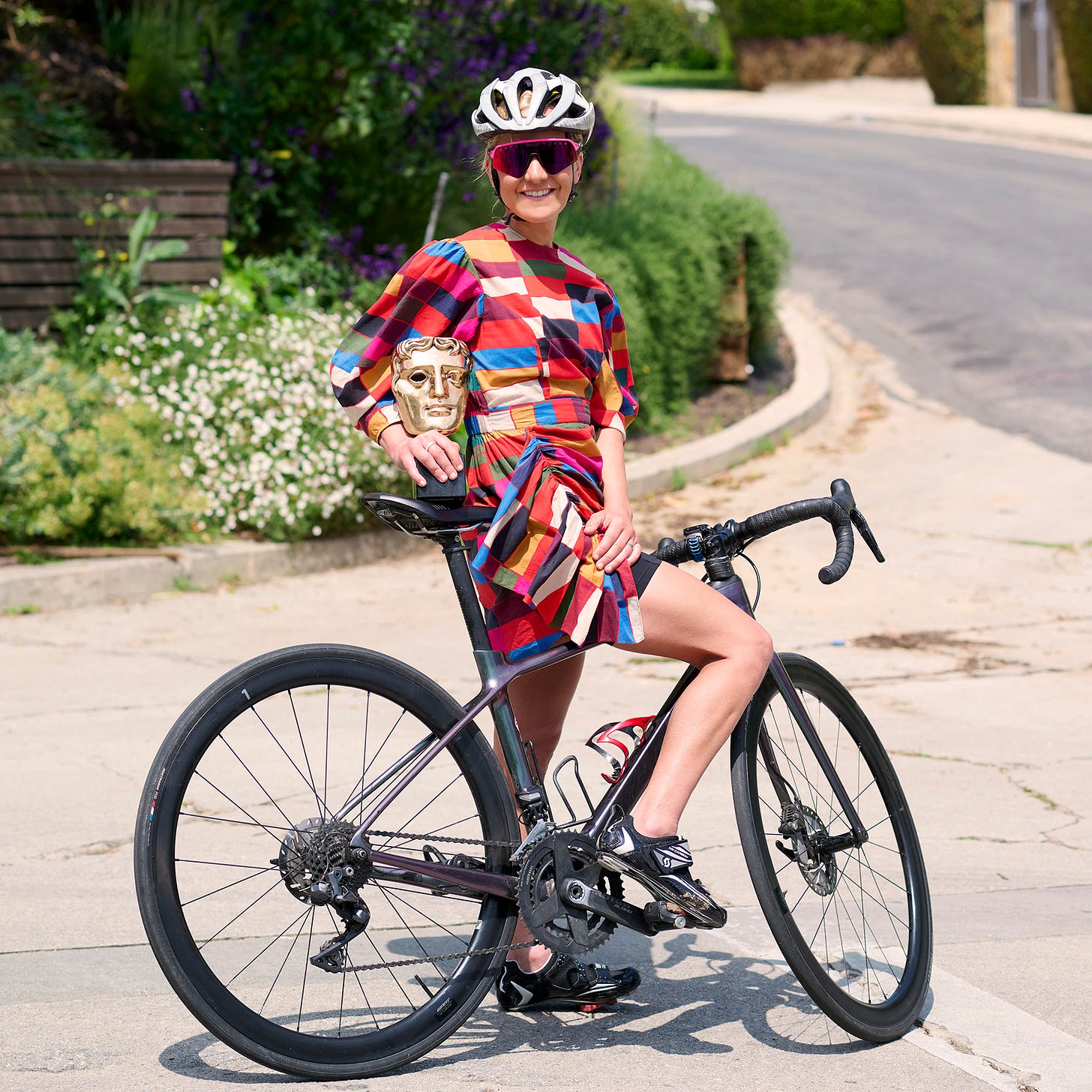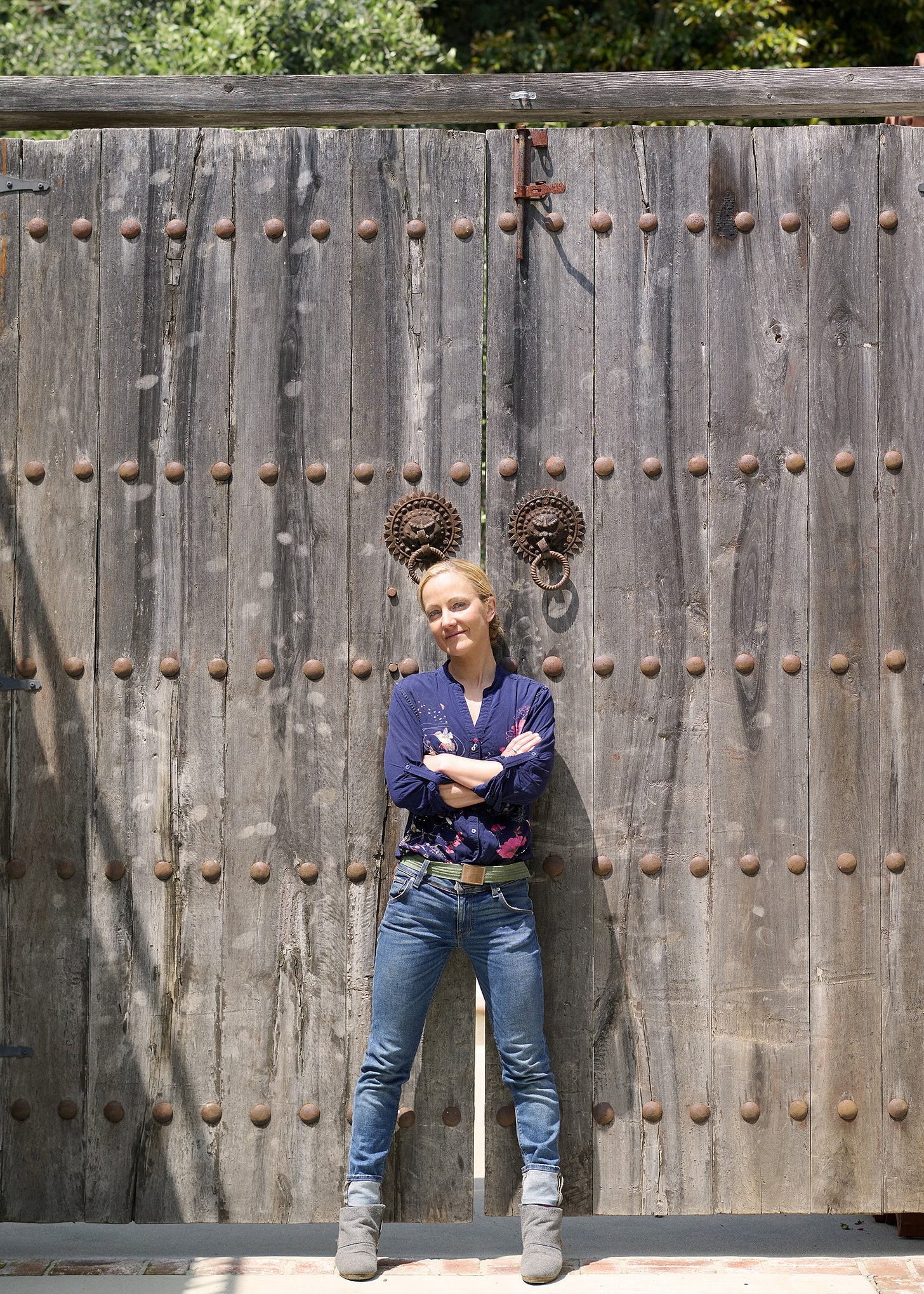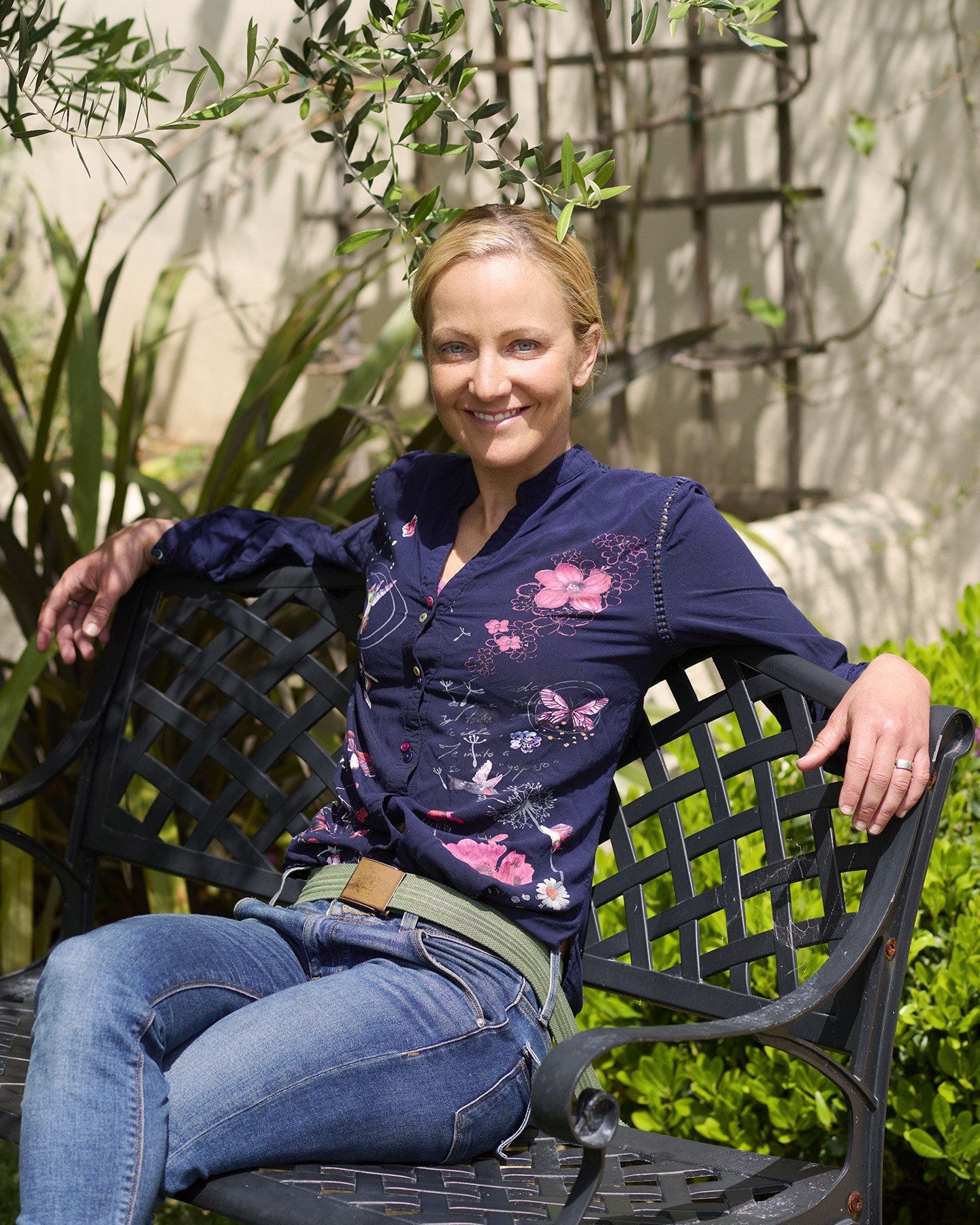Lesley Paterson - Creative Muscle
Meet world champion triathlete, Oscar nominee & winner of the Best Adapted Screenplay BAFTA for the All Quiet on the Western Front, with her own movie-worthy backstory.
Interview Katie Baron
Photography Perry Curties
Scottish dynamo Lesley Paterson, or ‘Les’ as I feel exceptionally smug to be invited to call her in our preliminary emails, is an irresistible combination of wildly personable, razor-sharp (the ‘Les’ is no accident) and candid beyond belief. The latter may be because she’s relatively new to the business of making Hollywood movies. Or, if not exactly new (a labour transcending most loves, All Quiet on the Western Front was a whopping 16 years in the making) then not an industry native, nor hardened to the ferocious, round-the-clock campaigning that encircles any Oscars contender. Or it could be the screeching adrenaline-crash comedown of awards season climax, considering things didn’t go exactly according to Paterson’s usually precision perfect game-plan, making her wholly ready to unleash.
Whichever, it’s four days after the 95th Academy Awards in LA where All Quiet on the Western Front – an astonishing adaptation of Erich Maria Remarque’s 1928 novel, showcasing the abject horror, futility and treachery (personal and societal) of WW1 via every hellscape possible from behind German lines – didn’t win the Oscar for Best Adapted Screenplay. Her devastation is both intriguing and endearingly palpable: ‘It burnt, absolutely; I’ve never felt like that before. I’d just spent the last two months creating a narrative around how I’d willed this film into existence and I’d totally believed it. I couldn’t understand in that moment how that hadn’t won through. Also, having been on the outside of the industry for so long – and it’s so, so hard to penetrate that network – there’s a massive fear of closing doors. I’m still processing it all to be honest, trying to settle back into the work.’ It’s not entirely surprising – you don’t get to be a world-beating athlete by feeling chuffed just to be in the running – but in a world of media-rehearsed soundbites and (particularly for women) stage-managed PR, it’s a slice of unvarnished, even subversive humanity that’s thrilling to hear. But settling she is not. Self-described as ‘obsessive’, she is so relentless in her quest to continue the momentum she was ‘already making new plans to capitalise on the opportunity, emailing people that same surreal night.’
The journey of making the film (technically the third cinematic adaptation of the novel, following versions in 1930 and 1979, but the first to be crafted in the German language) is, as Paterson herself might put it, bananas, and dispels any notion that ‘the narrative I’d created’ was some kind of hype. To understand how it was birthed – i.e. to get a handle on the Paterson supernova – it is necessary to track back to the beginning.
One of four siblings, Paterson grew up in Stirling, central Scotland, and was competitive from the off. She played girl’s rugby as the captain and the only girl in the league, until it wasn’t an option anymore (no girls’ teams), started fell running and was introduced to triathlons by her father when she was 13. By 15, she was representing Scotland and then Great Britain. You’d never bet against her. Well, not until a change in the competition rules decreed competitors had to be top tier swimmers (it was her weakest of the three disciplines) and she felt her time was up, heartbreakingly just short of the 2002 Commonwealth Games. Athletics gave way to theatre (at the time, she was studying drama at Loughborough University), she met her late husband, psychology professor Simon Marshall who became her writing partner (while uncredited on All Quiet on the Western Front, she says he was ‘instrumental to many parts of it’) and moved to California, settling in LA where she still lives. A Master of Arts (MA) in theatre followed, as did a short-lived stint as an actor, which she has zero plans to resume. In her mid-twenties she began collaborating as a producer and writer with fellow Briton Ian Stokell, a former journalist who served in the British military and was her co-writer on All Quiet on the Western Front, alongside its German director Edward Berger.
The novel was apparently always on her radar, a work she’d long felt an affinity with: ‘I read the book back in school and really felt the weight of betrayal of a youthful generation. As a Scot, I very much related to the sense of being an underdog but also being something of a chess piece for the powers that be.’ Indeed, All Quiet on the Western Front, a story that pre-dates Nazism but so painfully reveals how the seeds of it were sown in the ravages of those trenches and the aftermath of its war rooms, hinges on mostly old, privileged men sending oblivious young patriots to die, quite literally by the lorry load. In one of the earliest scenes, which Paterson conceived and remains most proud of, we see the ‘tracking of the uniforms’ – firstly being removed from the corpses of dead soldiers, then washed by hand before arriving back to clothe the next legion of troops. As the main character, student Paul Bäumer receives his kit still bearing the nametag of his recently deceased predecessor (a moment blithely swept away by the commanding officer). It ghoulishly presages everything to come – the posturing and the naivety and the nightmarishly calamitous deceit. ‘Writing that was an experience where you just know you have gold; you’re not sure where it came from but you can feel in that moment just how powerful it is. The way it worked out – the music, the cinematography, the dialogue – the whole thing was just incredible.’
But back to getting the thing made. In 2006, Stokell and Paterson initially optioned the book but a revolving door of actors, directors and producers saw it stall again and again. Every 12-18 months required a renewal to the tune of $10- £15k dollars, racking up an estimated $200k as the years ticked by and the ‘day job’ remained just as demanding: ‘I’d got back into doing triathlons by that point [aged 31, she won her first of five world Xterra championship titles], which was funding the dream in part, and we’d set up a training camp for elite athletes, but we still had to remortgage our house and there were credit cards…’ On the final chance to re-option in 2015, the cash had run out and, more cinematic than Scorsese, Paterson did the entrepreneurial equivalent of just one last heist and got back on that bike. However, in a test ride the day before, she broke her shoulder, necessitating racing, riding, and swimming with one arm strapped up. With brutal determination and bags of painkillers, she won – of course she did – and the game was back on. But it wasn’t until two world titles later when they pitched the idea to director Edward Berger and producer Malte Grunert (the duo came on board in 2019) that the proposition coalesced. Still living a double life, she and husband Simon were knee-deep in coaching trials for their elite athlete wards on the day the Oscars nominations were announced.
Berger has referred to the project as a vehicle for exploring, and to some extent exorcising, the cultural guilt and shame he says is inherent in being German as a result of the war that followed – a sentiment writ large in one particularly visceral scene set in a crater where Bäumer comes eye to eye with a Frenchman he’s just bludgeoned to the brink of death and the stark reality of their parallel lives comes full view. Despite being distributed by Netflix, and Paterson herself citing influences including Saving Private Ryan (‘tonally’) and Apocalypse Now (‘for the emotional chaos’), it’s no American tale of the hero’s (any heroes) journey. Indeed, the film’s capacity in such moments to invoke sympathy for its disenfranchised youth without obliterating that shadow of contrition is testament to Berger’s work on the script (‘Ed really infused it with a critical German sensibility that was so vital, there is something very uniquely German about the conversations, of understanding the Zeitgeist’).
Paterson and Stokell’s involvement, as both co-writers and executive producers, was less recognised via much of the promotional campaign. ‘Writers are marginalised,’ she states simply, and from a promotional perspective it’s clear their involvement risked diluting the award-chasing narrative of authenticity – i.e. a German perspective, this time from an actual German perspective. PR machine aside, its arguably the British involvement that serves to bolster its credibility in telling a story of universal carnage, shared misery, and of those fatal historic missteps to which every side must lay claim. Paterson and Stokell spent a solid year in the research phase, scouring everything from war diaries and political dossiers to academic archives, switching ‘the quite ethereal, meandering pace of the novel into something that felt like a ticking clock.’ The details soon laddered up. ‘I have a very strong sense of empathy and I not only wanted to send out this anti-war message, I wanted to create a film about WW1 that did it justice, because it’s such a pivotal point in history with so much we can learn from, but also to show the other side. Because mainstream cinema has predominantly been made in America, Germans have largely just been caricatures.’
All Quiet on the Western Front is arguably the ultimate origins warning story for the grotesque realities of ‘modern’ war and while the current Ukraine-Russia conflict has undoubtedly played into its Oscars success (it won four overall, including Best International Film), Paterson says it transcends a purely wartime narrative; it’s an allegory for our polarised society in which the blossoming of cancel culture, 0-60 outrage and a perverse pleasure in divisiveness is rife: ‘I was extremely motivated to create something that discusses the need to listen to the other side, of not always wanting to simply crush our enemies.’ Despite the tensions concerning recognition and the frustration of not being able to be on set during filming as a result of Covid, among other things (‘It was all shot in Europe and we were in LA; I can’t tell you how many times I cried about that’), Paterson remains steadfastly grateful for the learning experience (‘Edward is the best and the most talented in the business, it is a masterpiece’) and the opportunity she now has via her own production company.
She still trains (‘I’m addicted; it’s very hard to relinquish that addiction to how you feel and look’) but says her perspective on it is now different: ‘It’s a tool for unlocking creativity, rather than performance in terms of winning. Creative training and physical training are the same in some ways. You essentially create a castle to allow you to walk around it, you fill it up [with information] and trust in the process, know that something will come to you that will help you get over that creative or physical block or barrier.’
In late 2023 her personal story took a tragic twist when her husband Simon was diagnosed with stage 4 pancreatic cancer and after a short battle with the disease she announced the death of her ‘darling boy’ on instagram in June 2024.
So what’s next? After some time for reflection she is back in training and working on future projects which include a psychological thriller set in Scotland (thank you, Simon), a movie focussed on the travelling community in Ireland and another set in Ghana in 1901 that will deal with British colonialism. Once again, she’s battling for the other side: ‘I like to tell the stories that haven’t been told, or at least not how you might have known them.’
Shot in Los Feliz, California.






